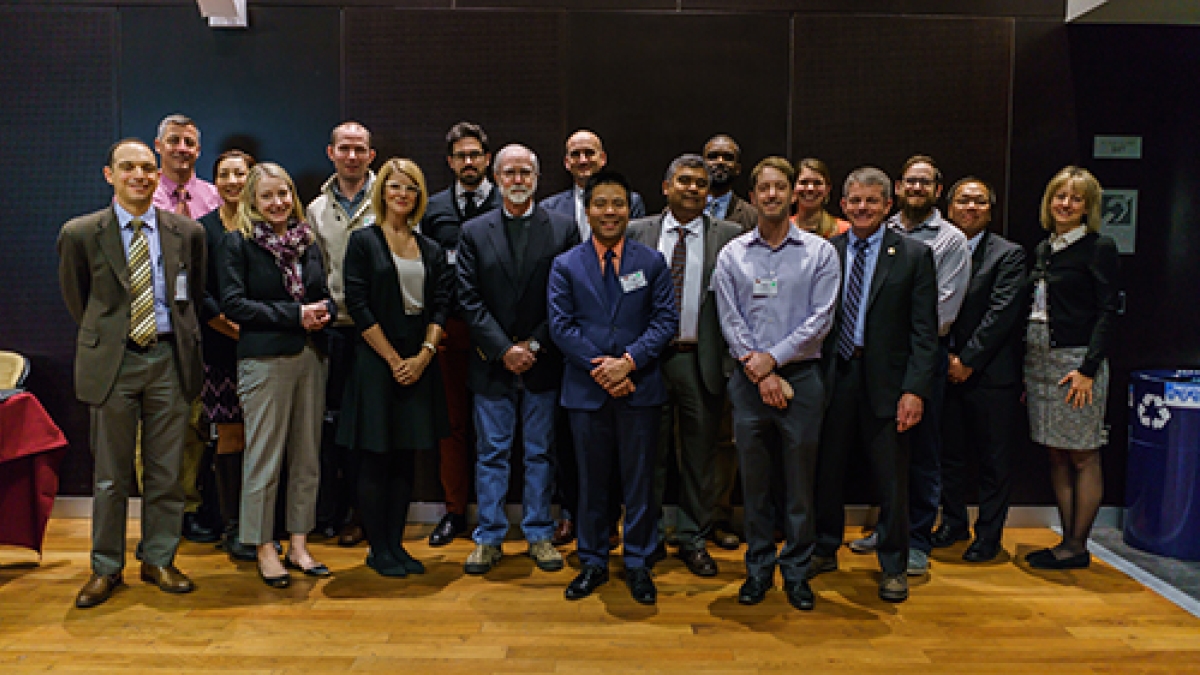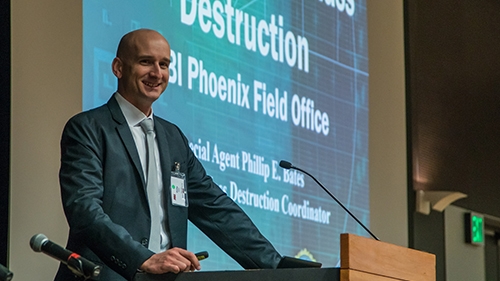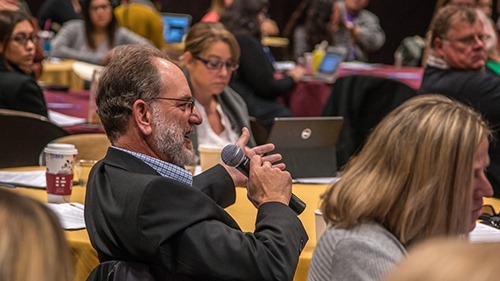Biosecurity conference forges international collaboration, meets need

Presenters at the Arizona Biosecurity Workshop at the Memorial Union on Dec. 7. The two-day workshop was organized by six ASU departments and schools for the biosecurity community.
Photo by Emmanuel Padilla/ASU Business and Finance Communications
Biosecurity professionals from across the U.S. and Mexico gathered on Arizona State University's Tempe campus Dec. 7 and 8, the first time a biosecurity conference of this scope had taken place in Arizona and one of the largest ever to be held in the U.S. Leaders in the field shared multidisciplinary approaches and perspectives on biosecurity.
“Stakeholders gathered to propose a definition and establish key aspects of this emerging field,” said David Gillum, ASU Environmental Health and Safety chief of staff and conference organizer. “We brought together a diverse set of perspectives to advance a shared understanding of this field of study.
Biosecurity prevents unauthorized access, loss and intentional release of biological pathogens, information and equipment that may cause harm.
Academia, emergency response, governance, regulatory and security professionals collaborated during the event. Scientists and professionals network in other settings, but this gathering was designed to be inclusive and to challenge presenters and attendees to work together so that no one was excluded from the conversation.
Researchers converge for consensus
“A largely unexplored issue in Native American communities is the definition of biosecurity,” said Otakuye Conroy-Ben, ASU School of Sustainable Engineering and the Built Environment assistant professor. “It may be different from tribe to tribe, representing the diverse lifestyles and priorities of sovereign nations.”
Several well-known experts in the biosecurity field, including James Collins and Bertram Jacobs (ASU), Megan Palmer (Stanford), Kenneth Oye (MIT), David Guston (ASU), Samuel Weiss Evans (Harvard) and Gigi Gronvall (Johns Hopkins) delivered keynote presentations at the event.
“The issues we discussed at the workshop sit in the white spaces between disciplines, so it is important to master the skills needed to work in this complex intellectual environment,” said Collins, Virginia M. Ullman Professor of Natural History and the Environment. “The rapid pace of technology development means we have to anticipate new challenges and be ready to react to them.”
The resulting relationships and a new understanding of this emerging field fill a need not yet met by federal and state government, or private industry. The community forum provoked conversations that do not always happen in the lab or the classroom.
“As biological science and technology diffuses into wider communities, we need new strategies to raise awareness of biosecurity issues and to alter norms and practices related to security,” said Megan Palmer, Stanford University Center for International Security and Cooperation senior research scholar. “There are many opportunities to both develop and evaluate different approaches in this field.”
First-responders and emerging vocations
Conference attendees addressed the knowledge gap between the experts discussing technical and policy implications with the professionals who manage biosecurity risks in labs, greenhouses and other research and development facilities.
Biosecurity protocol and emergency preparedness professionals participated to facilitate a more targeted response to potential emergencies. Government agencies such as the Centers for Disease Control and Prevention, FBI and the National Institutes of Health participated to make these ideas a regulatory reality.
The group from around the nation and world now have a network and a shared language to discuss biosecurity risks from Dual Use Research of Concern to cybersecurity.
Luis Alberto Ochoa Carrera, BSL-3 laboratory coordinator and a founding member of the Mexican Biosafety Association, took this perspective international with his presentation on biosecurity in Mexico. Ochoa Carrera also participates in the ASU and AmexBio program, part of the ASU in Mexico initiative.
“In Mexico, many different agencies decide what a biosecurity professional is, and there is a lack of standard training for people in the field,” said Ochoa Carrera. “This conference furthers the dialogues about a potential international biosecurity certification.”
The new definition and perspectives provided valuable continuing education for the diverse array of attendees. The resulting understanding provides new opportunities to create biosecurity professional certifications.
"The attendees fused intellectual disciplines and furthered ASU's goal to be socially embedded," said Gillum. "The new biosecurity definition is expected to give rise to continuing education and certification."
Conference sponsors included the U.S. Department of Justice, the FBI, the Arizona Biosafety Alliance (AZBA, an affiliate of ABSA International), Camfil Clean Air Solutions, CEM Testing and Certification Services and WVR. ASU partners included Environmental Health and Safety, Ira A. Fulton Schools of Engineering, School for the Future of Innovation in Society, Knowledge Enterprise Development, School of Life Sciences and School of Molecular Sciences.
Contact David Gillum with questions or information about the conference.
More Arts, humanities and education

School of Social Transformation faculty member assumes new title with NSF
School of Social Transformation faculty member and Founding Executive Director of the Center for Gender Equity in Science…

ASU's Neal Lester reflects on life, death of poet Nikki Giovanni
When Neal Lester heard on Monday that poet and activist Nikki Giovanni had died, the news hit hard.Lester, the founding director…

Learning by stepping outside
By Adriana MaestasAmid a world increasingly captivated by all things digital, more than 200 Arizona teachers have crafted…

